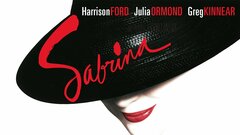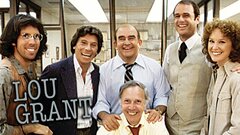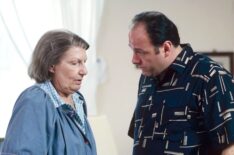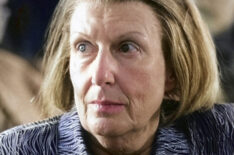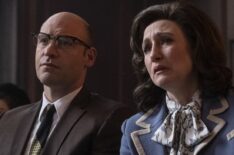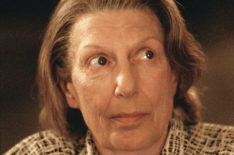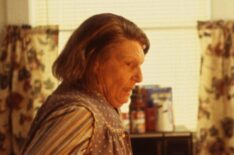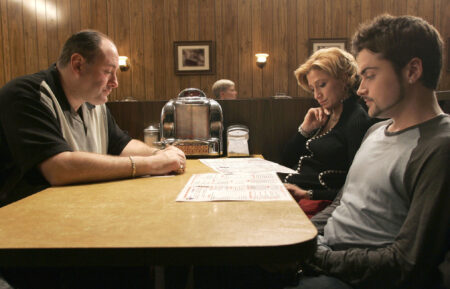With her patrician looks and wavering voice, Marchand has carved a niche for herself portraying upper class doyennes. While still in college, she made her acting debut in a summer stock production of "The Late George Apley." After earning a degree from Carnegie Institute of Technology (now Carnegie-Mellon University), she spent a season at the Falmouth Theater on Cape Cod, Massachusetts, before traveling north to Cambridge to join the Brattle Theater for two seasons (1950-52). Marchand squeezed in her New York stage debut in 1951 as the tavern hostess in Shakespeare's "The Taming of the Shrew."
She was to spend much of the next forty-plus years appearing in contemporary and classical theater. Marchand won critical praise and an OBIE Award for her performance in Jean Genet's "The Balcony" in 1960. Other noteworthy stage appearances include opposite Estelle Parsons in "And Miss Reardon Drinks a Little" (1971); as Vera Simpson in "Pal Joey" and Ranevskaya in "The Cherry Orchard" (Chicago, 1974); the eldest sister in the acclaimed revival of Paul Osborn's "Morning's at Seven" (1980), the title role in "Sister Mary Ignatius Explains It All for You" (1982); several productions of Clifford Odets' "Awake and Sing"; Ann, the mother who was always up for "just another splash" in A R Gurney's "The Cocktail Hour" (1988); and the 1993 revival of Anthony Shaffer's "Black Comedy."
Marchand made an impression in TV with her first role, as Jo March in "Little Women" (CBS, 1950) and also as Clara, the object of affection of Rod Steiger, in Paddy Chayefsky's drama "Marty" (NBC, 1953). She appeared in many TV productions throughout the so-called "Golden Age of Television" in the 1950s. In the 60s and early 70s, Marchand appeared on several daytime dramas including "Another World" and "Search for Tomorrow." She made her primetime series debut as the matriarch of a Boston Brahmin family in the short-lived 1975 CBS drama "Beacon Hill." Marchand is perhaps best-remembered for her portrayal of Mrs. Margaret Pynchon, the autocratic newspaper publisher, on "Lou Grant" (CBS, 1977-82).
Again, she played an aristocratic woman (reportedly inspired by Washington Post publisher Katherine Graham) who was just as opinionated, strong and stubborn as her editor (Edward Asner). Marchand received four Emmy Awards as Best Supporting Actress in a Drama Series for the role.
Marchand's film work has been sporadic since her debut as an unhappily married woman in Delbert Mann's "The Bachelor Party" (1957). She was a concerned adult who witnesses the reaction of several children when an air raid siren accidentally goes off in Frank Perry's "Ladybug, Ladybug" (1963) and was Patty Duke's mother in "Me, Natalie" (1969). Marchand appeared as another Brahmin in James Ivory's "The Bostonians" (1987) and had one of her best screen roles as the Mayor in "Naked Gun--From the Files of the Police Squad" (1988).
In Sydney Pollack's 1995 remake of "Sabrina," she nearly stole the picture as Harrison Ford's mother.
At an age when many might be thinking of retirement, Marchand landed the meaty, scene-stealing role of Livia on the acclaimed 1999 HBO series "The Sopranos." Cast as the harridan mother of a Mafia capo, she was riveting in the role. On the surface, her Livia was a frail, failing elderly woman, but underneath lay a heart of stone and a core of steel. Not only was she not as dotty and helpless as she led everyone to believe, she was willing to conspire with her brother-in-law in ordering a hit on her own son!
Marchand proved a delight in this change-of-pace turn and picked up a richly deserved Emmy nomination in 1999. The following fall, she publicly disclosed that she had been battling lung cancer for several years and that the series writers were considering incorporating that into storylines. Some might argue that because her illness incapacitated her, her presence on "The Sopranos" was curtailed somewhat to the detriment of the series. Marchand succumbed to cancer during the hiatus following the second season.







